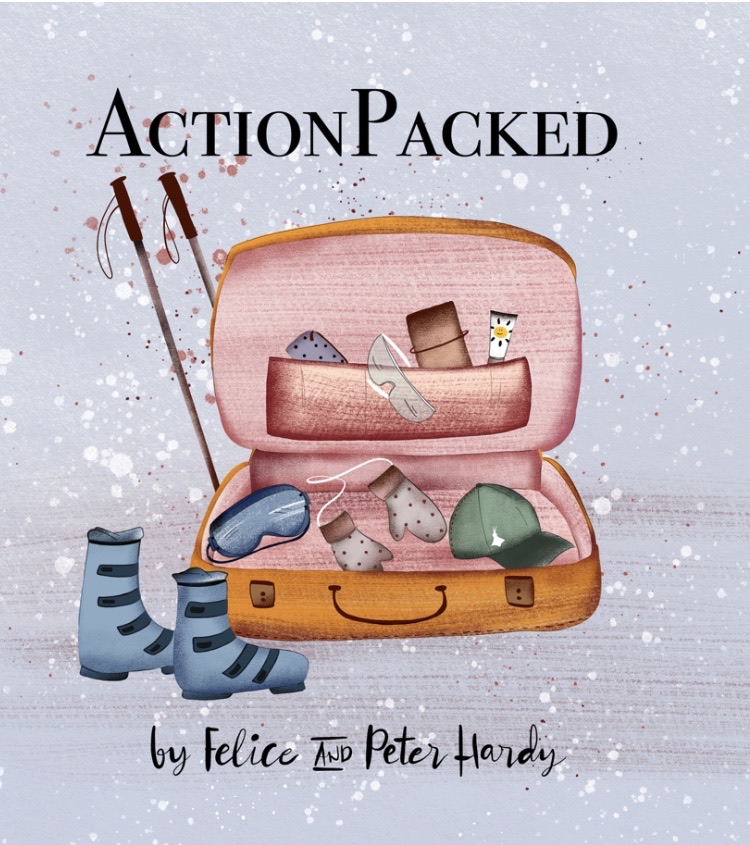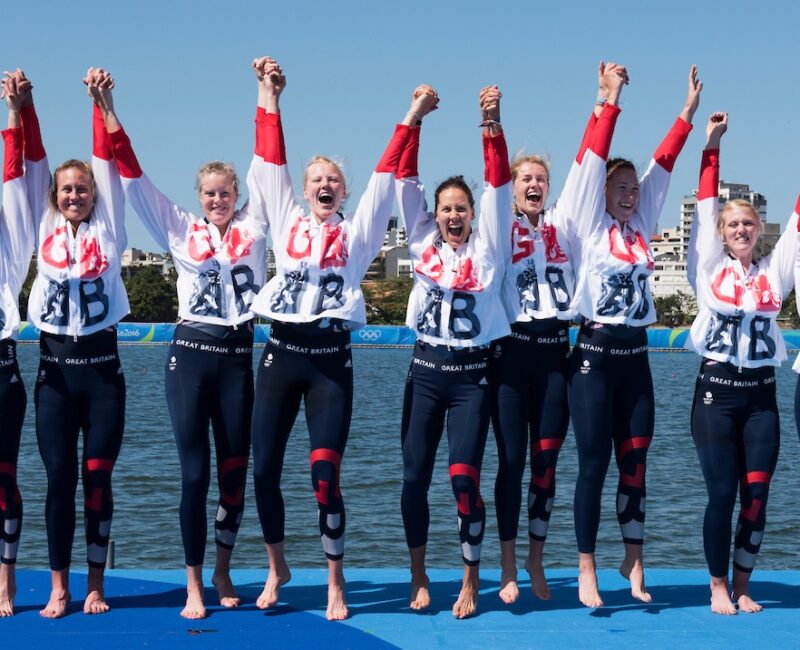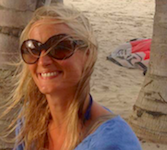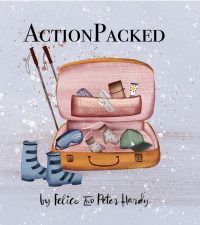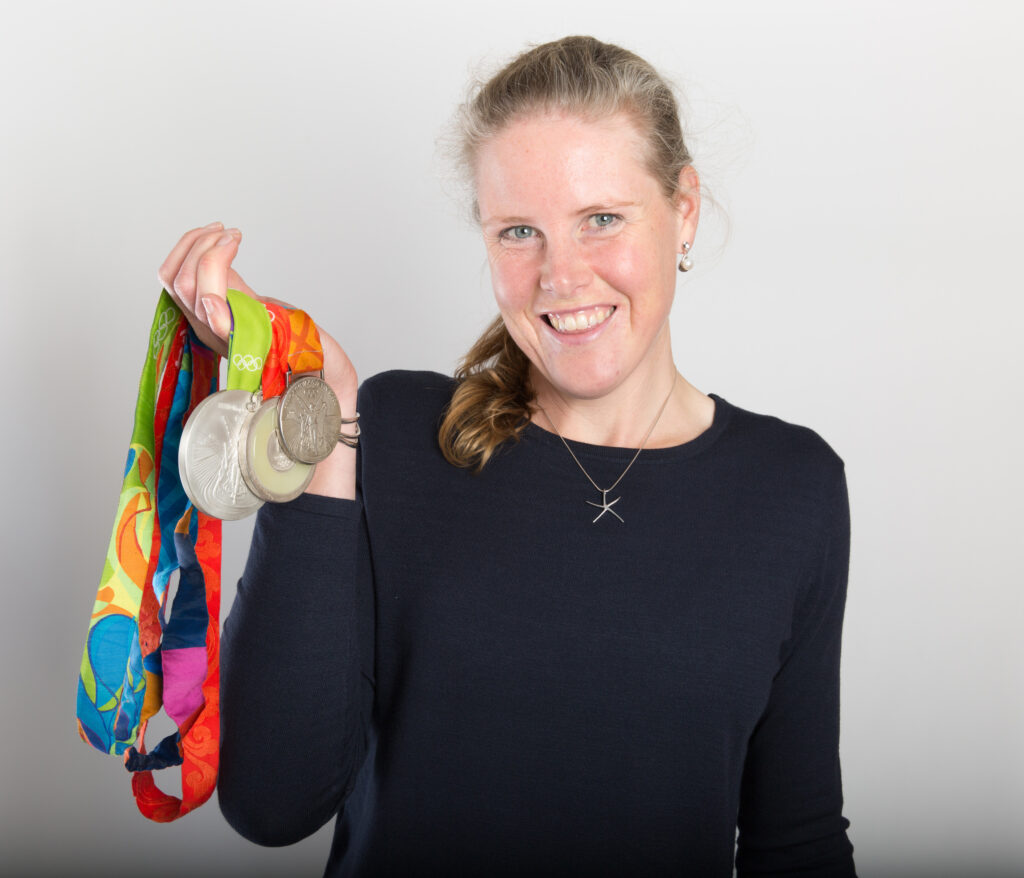
Peter Welcome to our travel podcast with specialist travel writers. And we’ve spent half a lifetime exploring every corner of the world.
Felice So we want to share with you some of our extraordinary experiences and the amazing people we’ve met along the way.
Peter This week, we’re talking to British female rower, Frances Houghton. During an illustrious 21-year career, she was four times world champion, picked up three Olympic silver medals and, astonishingly, Frances took part in no less than five Olympic Games.
Felice That’s amazing. I thought Steve Redgrave was the only person to do that.
Peter Well, Steve won gold at five successive Games, and he’s on a pedestal that’s unlikely ever to be toppled. But Frances was the first British female rower selected to take part in five Olympics. Frances retired from rowing after Rio in 2016 and now lives with her partner in Cornwall, where she mentors other athletes. She’s just published a book about her experiences and ActionPacked’s Louise Hall tracked her down to her home near Newquay.
Louise Take us back to the beginning. How did you get into rowing?
Frances So I got into rowing mainly because of my sister. She was very, very sporty, in everything. And every time I turned up to a P.E. class, the teacher would say, ‘Oh, this is great, because you’re going to be even better than her because you’re taller. And she’s really talented and she’s great at tennis and swimming and running and everything.’ But I honestly was useless. Like, I didn’t make the sandpit when I did long jump, tennis was just a battle between me and my brain in the tarmac, and swimming was just barely more than sinking.
And so I just got really fed up of being compared with her being with perpetual disappointment. And I thought, right, I’m just going to try the only sport she hasn’t tried – and that was rowing. And I was actually initially told, ‘Oh, you’re going to find this really hard,’ and put off it, because I was told ‘You’re really tall; you’ll find it very hard to balance.’ But actually it is hard to balance if you’re tall, but being tall is also a huge advantage because you have these long levers. And I just actually loved being out on a river on my own.
Louise Is that what you call your legs ‘long levers’?
Frances So I loved being out on a river on my own, I loved that feeling of moving a boat just down a river. So pushing off from shore, being away from things.
Louise And it’s that sense of rhythm as well.
Frances Yes, you can really develop that that rhythm and sort of oneness with something else…very special. And it gave me something to talk to other people about, because I wasn’t into theatre or playing games or girly things. But it gave me this common language with other people that I could build relationships through something else. And I think that’s what attached me to it.
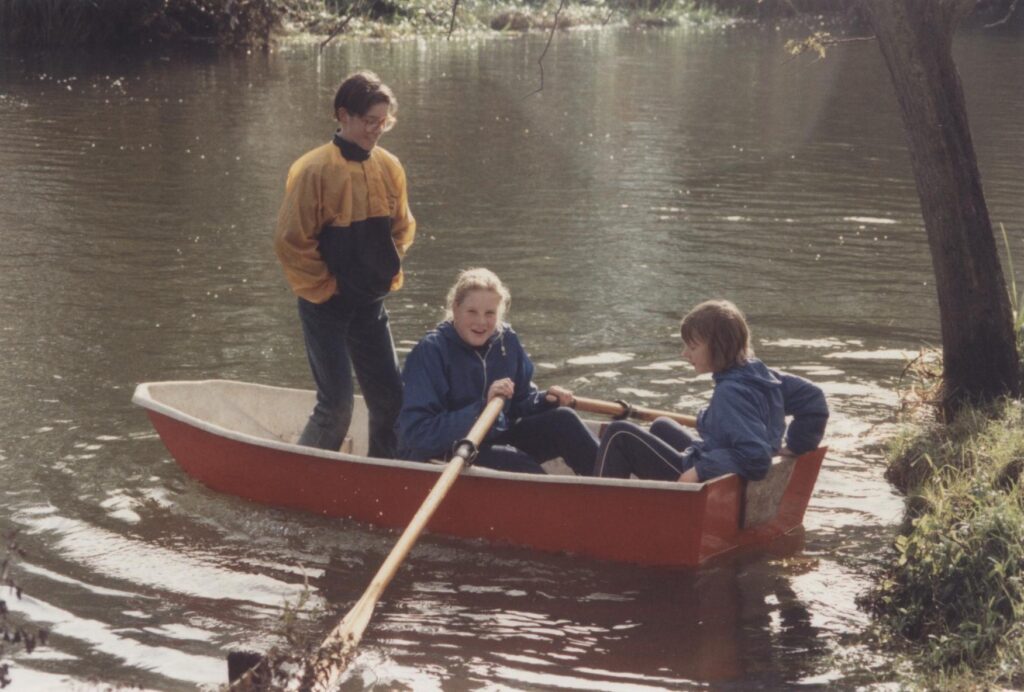
Frances learning to row on the River Cherwell in Oxford
Louise So how old were you then?
Frances I was nine then.
Louise That was at the Dragon School where your father was a teacher, Lofty. Why was he called Lofty and how tall was your father?
Frances My dad was about six foot seven and a pretty big set guy. So yes, that’s definitely where my height comes from. I’m six foot four, just over, so I definitely took after him. And so he was a teacher for many, many years and I think possibly that’s why the book I’ve written is Learnings From Five Olympic Games. I’m pretty sure somewhere in the back of my mind this comes from him being a teacher.
And it always instilled in me the importance of passing on from your experiences – don’t just keep them to yourself. It’s important that we all progress and we contribute to other people’s experiences. And so that, I think, is why, as someone put it to me, they said, ‘You’ve got all this stuff in your head and it’s almost like it’s too burdensome to keep carrying around and too valuable not to share.’ I really felt like I needed to articulate all these learnings I had over the 21 years and the five Olympic Games and all these different crews and teams that I’ve been in, and bring that into something really concise and clear so that it was tangible and usable for others.
You know, it’s not a bio across my whole life story; it is really personal learnings about performance, both the pragmatic stuff and the personal human stuff. And I think that’s very much what my dad was like. He was very disciplined person. It definitely taught me discipline, but he was also very, very human and he was a sensitive guy. And I think hopefully, over time, I’ve managed to dial into more than just being really focused on trying to achieve stuff. Because, as I say, it’s not about getting it done, it’s about what you do and enjoying that process along the way.
Louise As well as being a three-time silver medallist, four times world champion, you’re also in that five times Olympic club, alongside Katherine Granger, the first British female rower to compete in five Games?
Frances Yes, so the first female British rower to be selected onto the team for Rio, which was really exciting. And that was an aim that I made myself when I came back from my first Olympic Games in Sydney. I had such an incredible time, I was actually just sat on my scooter on the Embankment in Battersea coming back from my lectures at King’s College London, and I remember I was just thinking: oh, what an incredible experience that had been to watch my teammates stand on the Olympic podium and win various medals, including, of course, Steve Redgrave winning his fifth medal – fifth gold medal. I thought, oh, my plan was just to go once and then go out and get a proper job, but how many more Olympics can I possibly fit in before I’m too old?
And so back in October 2000, that’s when I made my vow to myself to see if I could possibly be the first woman in Britain to get to five in rowing. And actually, it turns out there are only five of us in any sport that have been to five Games. So it does feel like a really small, privileged club, but it was worth the hard work and some of those last years were pretty hard to get through but I’m glad I persevered.
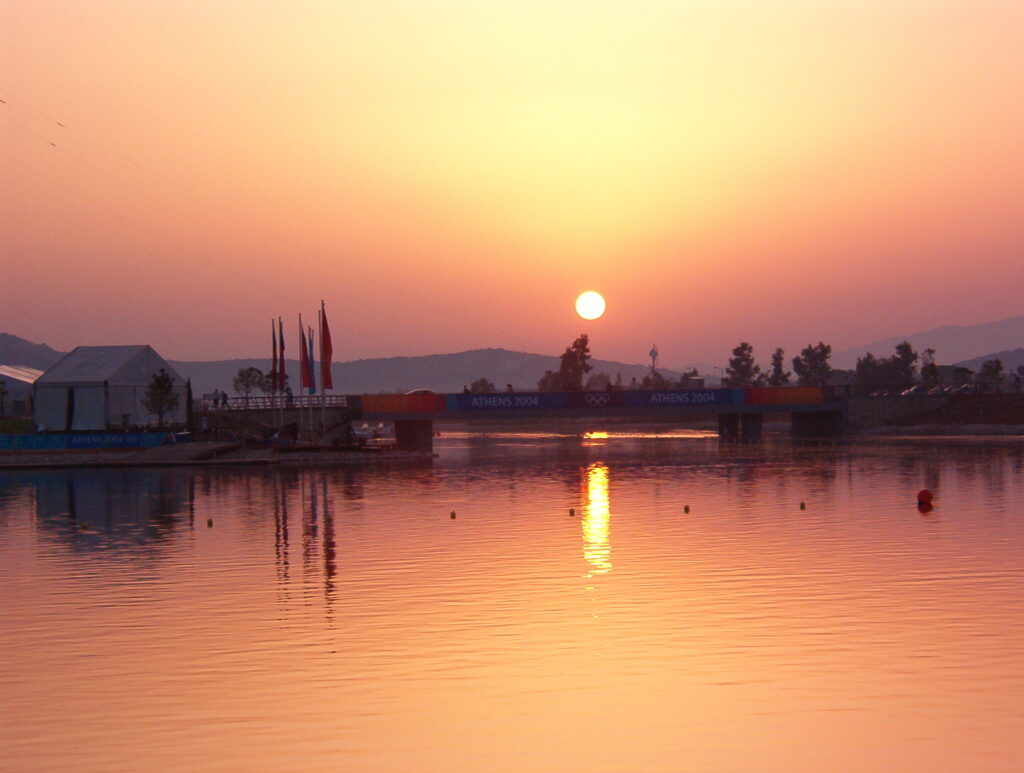
Sunrise on the morning of the final at Athens, 2004
I went to Sydney, Athens, Beijing, London and Rio and, as you said, I was 19 in Sydney and I retired at the age of 35 in Rio. Yes, they were different. I think Sydney was a real celebration of sport. Athens was very much this is where the Olympics were born, all the ancient stadia; it was incredible to be where the Olympics began. And a lot of the infrastructure is not finished, but it didn’t feel like that really mattered because it’s A it’s just part of the story, and B it doesn’t matter because it was the history that was the defining feature of those Games.
And then Beijing was very much about what it looked like on the TV, so you might be in a stadium and all the spectators would be on one level and everywhere else would be blacked out. And although you could sense that and you knew that when you’re in the stadium, you knew that on TV it would look like it was full.
And obviously there was a spectacular opening ceremony, spectacular closing ceremony for Beijing, I didn’t get to see them because I was sort of inside them rather than outside. But I think they’re pretty famous for that, for the opening ceremony in Beijing and then in London…
Louise London did pretty well, I thought.
Frances I suppose, yes, London did very well, an amazing story you can tell through culture and art. And I think what for me was amazing about London was that it was where my friends and my family and of course the wider public was as well…but they experienced Olympic Games and could understand: ‘Oh, I see. This is why you’re so hooked on it and this is why it’s special.’
And then Rio, for me especially with my connections to South America, it was just a real cultural explosion and really nice to go. I’ve always much preferred travelling away to compete because I felt like it was a level playing field. I didn’t like it when we got special treatment or we were trying to just go on our own team bus. I would much rather I was on a bus, just an athlete transport. For me, it’s really important that, as I say, everyone’s equal and then we’ll compete when we get to the start line; I don’t want unnecessary advantages. And so you get a sense the energy of other people, and I always really thrived off that. So I was really glad that my last one was a long haul trip away from the UK. So, yes, Rio was a really lovely celebration one to finish on.
Louise I understand it, but I feel that you’re beating yourself up quite hard for perhaps not getting that gold, which you possibly deserved. But still, that’s such a win, isn’t it? That’s such a historic feat to have got to five Games?
Frances Yes, I think the five Games I think I had two goals in my rowing brain – and one was to get to five and one was to be an Olympic champion and to win and to be the best in the world. But I do know that I tried everything and I did everything I could to try and fulfil my potential.
And I think it made a big difference for me. I talk a little bit about this in my book. A couple of years before the end of my career, I really assessed what it was that I really valued and if I only had two years left, what could I possibly get out of those last two years? And I realised that what I valued the most wasn’t just the winning cruise, it was when I was with others, collaborating with them to see what it was possible that we could create together.
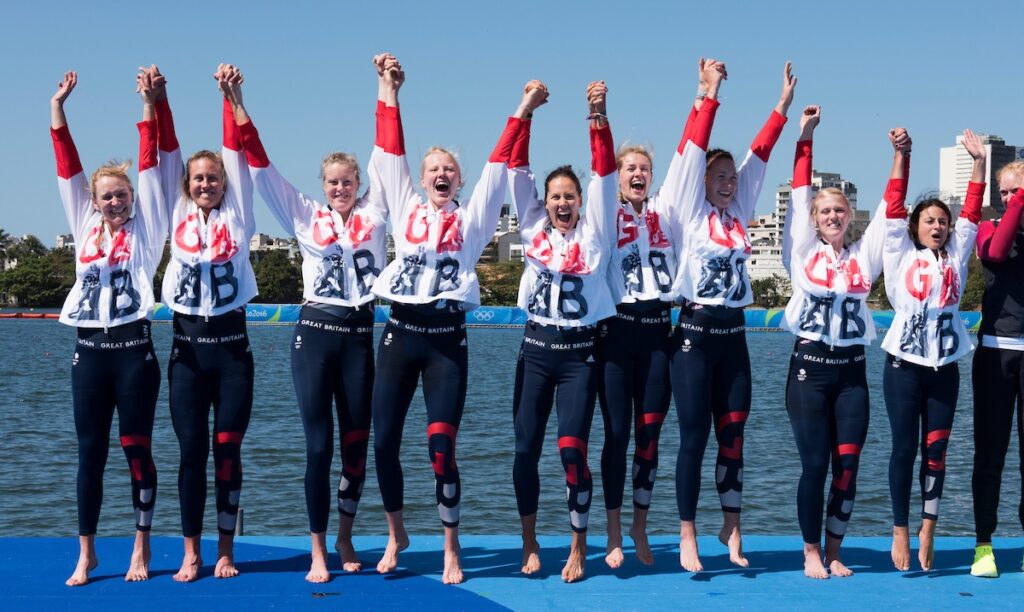
Celebrating at Lagoa Stadium, Copacabana, Rio
And when my focus changed from ‘I’ve got a win’ to ‘what can we create together and enjoy the adventure,’ it just completely opened everything up. It’s way less pressurised and actually released a much higher performance level. I never would have thought that I would have been standing on the podium in Rio, but having this change of mindset and really embracing working with other people, rather than that real feeling of individual pressure that I had to fulfil this dream to win. And that change…I’m really glad I took some time out to really assess things. And yes, it’s a shame. I stood on the podium in Rio and I knew I hadn’t won and I never would win, but I was still really proud of what we had done as a team.
And I think actually it was back from the times when I when I travelled, when I was younger, and that, number one, it gave me a real perspective like there when you go to a completely different country, I don’t know if you’ve found this, but it made me realise there are so many different ways to live. And just because n my own little bubble in my world, I felt like a pressure to to live or to deliver certain things of expectation in my world.
Gosh, you know, there’s just there’s no need to feel like that when the world is so much bigger. It’s so refreshing and freeing. I mean, the second thing was the relationships I had formed with people when travelling and I think that really opened my eyes. You know, I am an introvert, I’ve done a lot of sport on my own, but actually to experience those relationships where you build bonds through adventure and you don’t know what’s going to happen, that was something that I really tried to bring into my sport as well. And I think that was really important, because when things get tough is the people and each other that get us through and make us discover things we don’t know about ourselves.
Louise Your book, Learning from Five Olympic Games is sensational. It’s a journey in its own right, I imagine, to write it?
Frances As anyone who’s ever tried to write, it’s very easy to say, ‘Oh, I’ll write it down, I’ll write a book.’ But it’s very kind of you to say so; thank you. Yes, I was determined to do it on my own, I don’t know if that stubbornness or stupidity, I’m not sure. But yes, I’ve done it completely independently down in Cornwall. And I think the main thing for me was giving myself permission to do it – so I didn’t win, so what right do I have to write about performance? But as I say, it did feel like a real need. I still felt that I had important things and valid things to share, and I have a perspective from being at the top of the team, being one of the world’s best rowers, to struggling around at the bottom sometimes as well– and I think that’s where I learned my most.
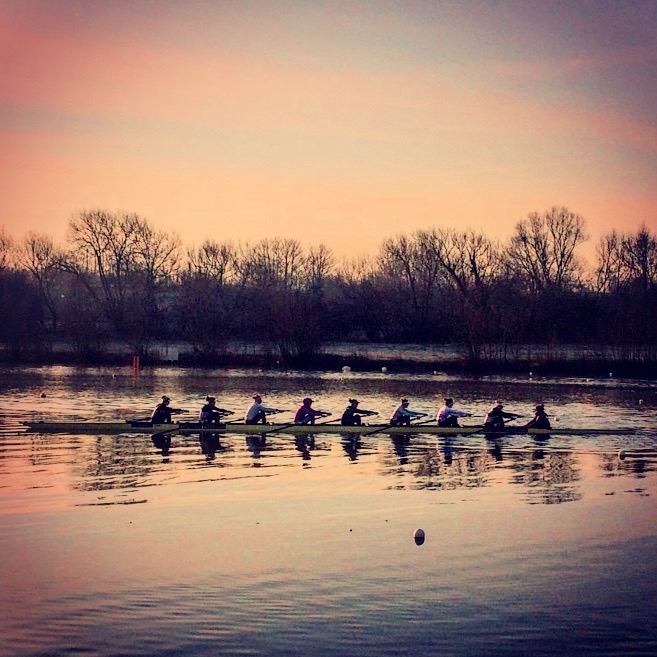
Winter training at the National Training Centre, Caversham in Berkshire
Many of us don’t get to win all the time so it’s probably more tangible to most of us to be learning from someone who doesn’t win as to someone that does. So, yes, it was a real process but as I found in my sport, when I found the right people to work with, my goodness it completely opened up what was possible. I had all my content and then I found someone who said, ‘Oh, I’d really love to help you clean this up and make sure you use the same tense all the way through, rather than sort of jumping around all over the page.’
And it’s just been amazing – a wonderful digital formatter who took my sketches and has basically produced what you see now in terms of the colouring and the vibrant illustrations that she’s brought into the book. And I’m really very grateful. Initially, I thought everyone should be able to do everything themselves, but every single element of it has been done with local people down in Cornwall. It’s just been wonderful to work with other people to bring something to life. And it’s exactly the same as I’ve found in sport, but that’s what I found in bringing the book to life as well.
Louise It’s quiet and considered and deeply reflective, but at points I thought it’s quite brutal. It’s always honest and authentic. Is that the voice you were striving for?
Frances Yes. And I think that’s why it took quite a long time to find the right balance between the pragmatic and the brutally honest stuff – like you do need to work hard, you do need to confront a whole lot of stuff. But there is a whole load of soft, nuanced stuff that really matters as well when working with others, and also in our own empathy for ourselves. So, yes, I absolutely want to convey with brutal honesty about what it takes, but also with absolute acknowledgement, without undermining my own credibility about my own self reflections and self awareness and my own shortcomings, because they’re absolutely part of it as well.
Louise And for me, there are a few real takeaways – the power of being in the flow. And I think that having spoken to Chemmy Alcott and Jenny Jones, the skiers, they really talk about the importance of being in the moment and going with the rhythm and being in the ‘now’. The power of connection of human relationships, which you talked about a bit, really came out. I suspect, of being in a boat with eight of you, that dynamic is pretty important?
Frances Absolutely. I mean, we are obviously physically attached to each other, but we also need to be completely in tune, mentally. So in the middle of the race in Rio, we were coming last, we were tipped to at least win a medal, but to be able to get to a point where we would think and respond intuitively and exactly the same way to that pressurised moment, that really did involve a real deep understanding of each other and of ourselves.
You know, the first thing I wanted to do is do something completely different, but that wouldn’t have worked in the team…and really understand each other and listen to each other. So that connection, the emotional connection, the absolute commitment to each other emotionally, you know ‘I will not steer away from what we have agreed to do and the commitment I’ve made to you.’ I think I use it as a quote earlier in the book as well, when I’m talking about teams, is the ultimate team is when you can’t pull another stroke for yourself but you can for those around you.
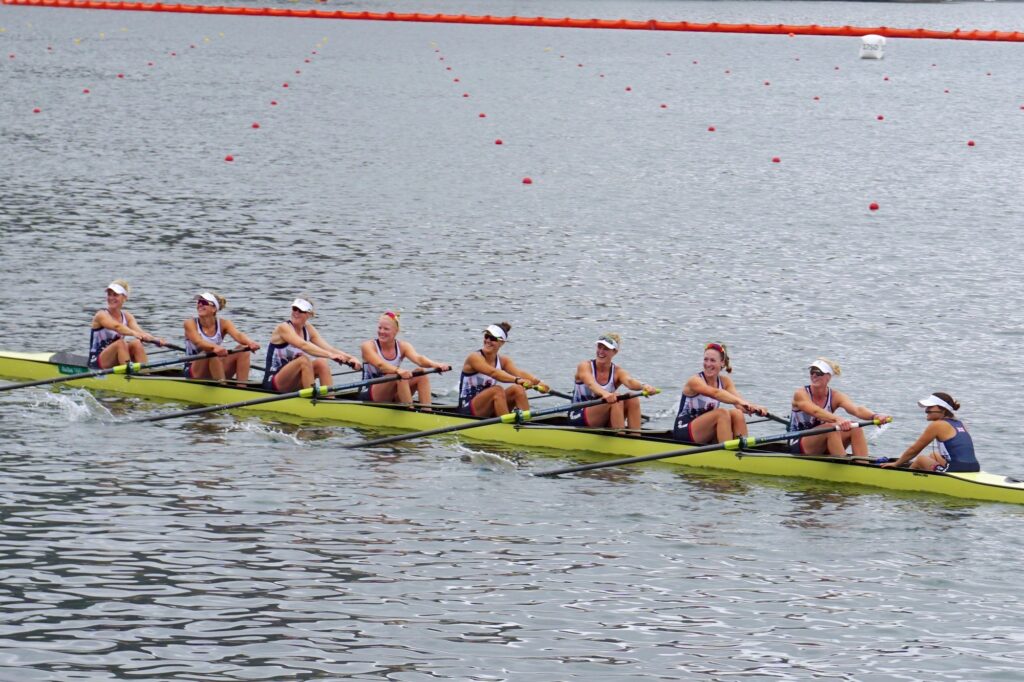
Frances And I’m sure people have found this in their own lives or when you’re travelling. If your travelling buddies are having difficulties, of course, you don’t even think about yourself, you go and make sure that they’re all right. And as I say, relationships, whether it’s travelling or it’s in the middle of an Olympic final and you’re coming last and you really shouldn’t be coming last. The power of all of our points to other people really do make us do extraordinary things.
Louise And also the emotional aspect to injury. Tell us more about that?
Frances Yes, no one ever wants to be injured, of course, it’s just not really in plan A but it is inevitable. Well, for me, it was over my long career, and a lot of my injuries actually were the physical manifestations of emotional stress. I was trying really hard, I was frustrated that I hadn’t won the gold yet, and my body was just telling me it needs to rest.
Louise You also had your father being ill around that time. Didn’t you? You did have a lot going on at that time.
Frances Yes, before Rio, absolutely. I had a major injury or illness; I was burnt out basically in 2014. This is what I refer to in the book about the moment that I change my mind. So I reconciled myself with failure, redefined what success was to me.
But my dad was very ill and he has a long battle with cancer and ended up that he died actually when I was doing my final race in Lucerne. My favourite place to race was about six weeks before he passed away whilst I was competing in Lucerne. And I always think, oh well, he knew that I was in a good place. He knew I was in a team that I was enjoying for the first time in quite a while. And I think that he thought: ‘Now is the time to go because I’m going to get the best spot now. I can see it from above and I’m going to get the best view.’ He was a huge fan.
He loved the travel aspect as well. I felt really guilty when I was injured or didn’t compete for some reason, he’d say: ‘Oh no. So I don’t get to go to Lucerne,’ or such and such a place, but there’s often a way to think of it as an opportunity for something else. And for me as an introvert, often it was a really good opportunity to get away from the very intense social environment of the centralised training system. So I’d come back and I’d be able to get some perspective, some space.
Louise I wanted to come to walking because Salcombe was one of the places that you spent quite a bit of time in your childhood and where father was a really keen walker and you’ve become a rambler.
Frances I’m very fortunate that I can walk from my front door, so I just make sure I get out each day. I really enjoy that and really relish the outdoor space and the sounds, even if it’s the sound of the wind and the colours. The winter colours are beautiful, I think, as well…so the skies and seas and sand.
I’ve been down in Cornwall for about four and a half years after I retired from rowing, after the Rio Olympics in 2016. That’s when I started to look – myself and my partner trying to find somewhere down here, and it took a few months to find something. It’s been wonderful to be away and to be somewhere that I feel is spacious and less hectic.
I’m a rambler, I like to go out sometimes without a plan at all. The walking to me is a part and parcel of every day. Of course, like most young people our parents drag us out walking and we absolutely hate it. But I’m so glad that they’ve instilled in me that pleasure early on. And for me, an ideal day would be going out with a thermos and a sandwich and going off for hours and having a little picnic somewhere and exploring places by walking.

And I read a most wonderful book by Mcfarlane, and he wrote about the old pathways and how when you’re walking on pathways, you’re on top of someone else’s footsteps, with layer upon layer upon layer of experiences and ghosts and futures. And I just thought that is such a wonderful image. And for me, if I see a footpath sign, I’m just constantly looking left and right on roads. Where does it all go? Where does that one go?
I found a walking app and it’s called I Walk Cornwall. And some wonderful mystic person in my head, just this absolute hero, has gone around Cornwall and written and walked all over the place. You can search by woodland, shady, circular, beech, sheltered, whatever it is and more and so you can click on a dot and it’ll take you somewhere that you’ve not been before. And I’ve given up sort of trying to plan it too much. I just think I’ll just pin the tail on the donkey and it’ll take me somewhere in the county. It’ll tell me where I’ve gone wrong. It’ll tell me when my phone is going to run out of battery before I’ve got to the end.
And so all I have to do is walk along and it beeps when I have to go over a stile on the left or the right. So I get very excited when I find someone who says, Oh, I like walking and they don’t know about the app yet. I feel like I’m opening up in an Aladdin’s cave for them.
Louise Did I hear that you’d like to do some ramblings with others?
Frances It will be wonderful to do a walk with an Olympian type theme. My learnings were from my own experiences, but it means something different to everyone. Everyone’s context is different. So walking with others to understand what these things mean in their context, really interests me. So I guess it’s spreading my love for the outdoors and for walking and discovery, and discovering was close to us as well.
Louise Two final questions. Tell us what it was like being in Sydney with Sir Steve Redgrave? You were starting your quest for gold and he was finishing his…
Frances It was incredible to be a part of the team that Steve Redgrave…He obviously knew it was going to be his last Games, and was trying to get the fifth gold in a row. And I think something that people often don’t appreciate about Steve Redgrave is that not only did he win five golds, but he peaked on five different occasions to do that over this 20-year period, which is just incredible.
And I remember the lake in Sydney, honestly it trembled. It trembled when he was racing that final race. And I’ve never felt anything like it or as profound as that moment. Everyone in the rowing world, and I think the Olympic world, really knew that it was something something really special.
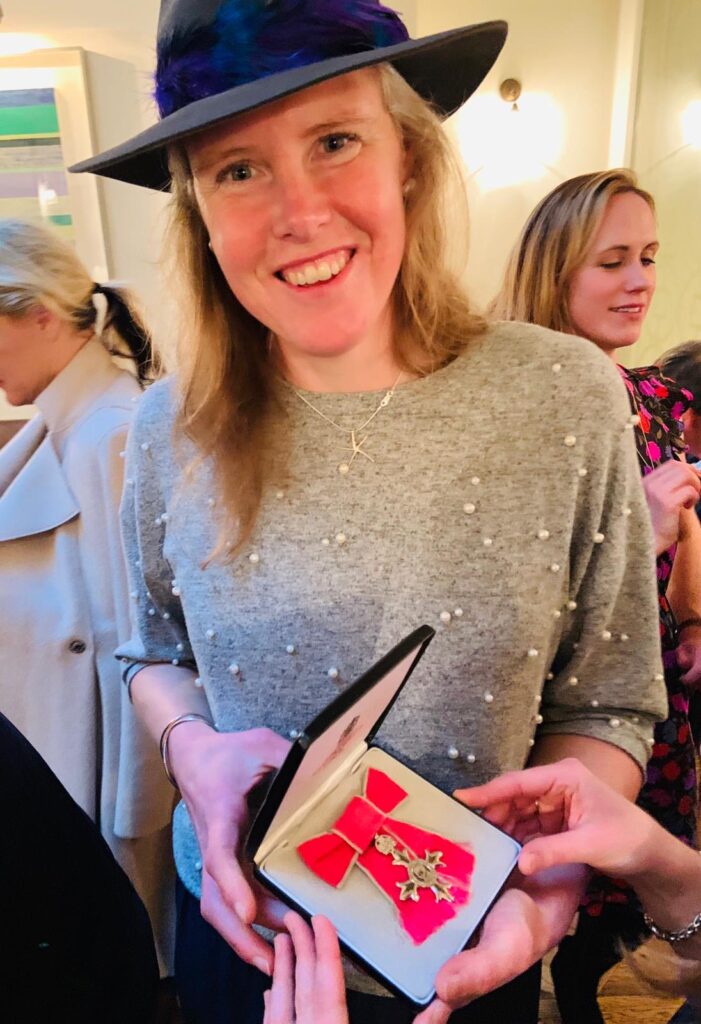
Being awarded MBE for services to rowing in 2017
Louise And lastly, away from rowing, what was the favourite Olympic performance that you witnessed?
Frances When people ask me what my favourite Olympic memory is, it would be Cathy Freeman running her 400-meter Olympic final. We were sat on the start line and she walked into the stadium and she had the expectations of a nation on her shoulders, a nation and her people. No Aboriginal woman or man has ever won an Olympic medal before this. And she had lit the flame the week before.
The stadium was absolutely silent. It was that time when track and field athletes wore all-in-one Lycra suits that went all the way down their legs, their arms and the hood. And it was silent. And she put this hood up, and she knelt down and she just took this moment to herself. And then when the gun went off, all you could see was the flashbulbs going off around the stadium. And then when she crossed the line, it just erupted. Is was just something…it was like fireworks in sound, in sense and presence, in colour.
And because we were positioned where we were – it was supposed to be the cheapest seats, but actually the most incredible seats because she’d just crossed the finish line and she knelt down on one knee and she had these gold spikes and she sat there and she took her spikes off and took the hood off her head. And she just took this moment to herself whilst her whole country sort of erupted around her. So I feel really privileged to have been able to go to a Games and see something like that, alongside other athletes as well.
Louise That’s fantastic. Thank you. And if you enjoyed listening, you can find out more about Frances’s rowing adventures, learnings and positive mindset coaching. Where can people go to buy your book, Frances?
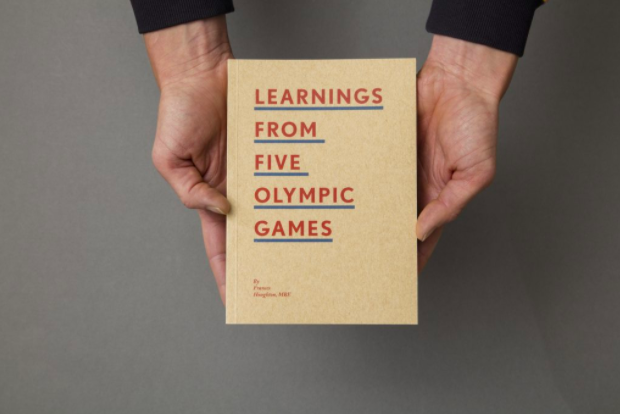
Frances So, it is called Learnings From Five Olympic Games. It is what it says on the tin. It’s all through my website, as I said, independently published. So that’s the only place it’s available and it’s my name, FrancesHoughton.co.uk. You can get to me through social media channels on Twitter, Instagram, both of which are @HoughtonFrancis.
Louise And if you ask nicely you might even get a signed copy. Thank you so much for your time for appearing on Action Packed Travel podcast. It’s been humbling. It’s been inspiring. We wish you the very best of luck in the future with your book, walking and future endeavours – wherever in the world they take you.
Frances Well, thank you for having me on.
Felice That’s all for now. If you’ve enjoyed the show, please share this episode with at least one other person! Do also subscribe on Spotify, i-Tunes or any of the many podcast providers – where you can give us a rating. You can subscribe on Spotify, Apple Podcasts or any of the many podcast platforms. You can also find us on Twitter, Facebook and Instagram. We’d love you to sign up for our regular emails to [email protected].
© ActionPacked Travel

- Join over a hundred thousand podcasters already using Buzzsprout to get their message out to the world.
- Following the link lets Buzzsprout know we sent you, gets you a $20 Amazon gift card if you sign up for a paid plan, and helps support our show.
